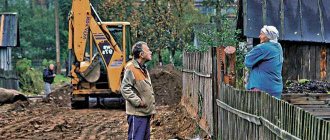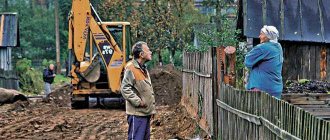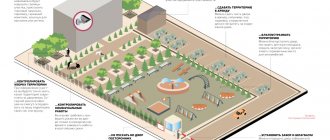A share implies a separate part of the land from the general tract, owned by several shareholders. Such land is located outside the city and is intended for agriculture. The main use is possible for breeding livestock, growing agricultural crops, and processing agricultural products.
Due to their value and fertility, agricultural land is under special state protection, as stated in the Land Code (LC). The turnover capacity of agricultural land is based on the principles:
- possibility of privatization;
- localization of permissible area;
- constancy of purpose;
- the state and co-owners have an advantage in purchasing the share;
- property arises exclusively from a citizen of the Russian Federation.
You can receive a land share, in accordance with the law “On the turnover of agricultural land”, in the following ways:
- buy;
- inherit;
- form a selection.
Exceptions to the application of this Federal Law are allocated shares allocated for farming with permission for gardening and gardening activities. Their turnover is regulated by the norms of the Land Code and the Civil Code (CC).
Registering a share of land as a property upon purchase: step-by-step instructions
The practical application of legislative acts by the court in land issues often raises controversial issues. This is due to the lack of enforcement hierarchy and specificity in regulations.
For example, Supreme Court Resolution No. 54 established that a purchase and sale agreement for future real estate (that is, a plot that has not yet been registered) is legally binding. The Civil Code of the Russian Federation also does not establish prohibitions in relation to future objects, while the directives of the Land Code of the Russian Federation clearly define that ownership of land arises only within the defined boundaries and after registration in the cadastral register.
Since the obligation to register the object will still arise, as well as to avoid potential legal precedents, both parties to the transaction should go through the registration stages indicated below.
Step 1. Preparatory process
A share owner who wishes to sell his part of the land must first make sure that:
- the land is registered in the cadastral register (read more about what cadastral registration is);
- Registration has been completed in Rosreestr (USRN).
In addition to the above, you need to do the following:
- notify the government agency about the sale of a share of land;
- notify other owners of the common plot.
Rule of pre-emption by authorities
For agricultural land, the rule of preferential purchase by the state (PPP) applies; it is determined by the requirements of the law on the turnover of agricultural land. The seller is obliged to notify the subordinate body of his intention to sell the land share. The notice must contain the following information about the site:
- address;
- price;
- area (in hectares/square meters).
The notice must be sent by registered mail or delivered in person against signature. The municipal service sends a response within 1 month from the date of receipt of the notification. Refusal to purchase a land share or lack of response serves as the basis for the sale of the land share to a private person, at a cost not lower than that stated in the notice. If the state accepts the terms of sale, payments are made no later than 3 months.
There are precedents in judicial practice when a government agency denies receipt of a notification. As an additional measure and to avoid controversial situations, a publication in a newspaper can be made simultaneously with the notification sent.
Ignoring this action entails the invalidity of the purchase and sale transaction and has no legal consequences. This means that the share will be returned to the seller.
When the PPP does not apply:
- there is a registered building on the land;
- The share is pledged and the obligation on it has not been fulfilled - such a plot is put up for auction.
PPP of shareholders
It is worth noting that the advantage of purchase is also regulated by the Civil Code, which calls for offering other owners from the common allotment to buy out the land share. This can be done simultaneously with sending a notice to the authorized service.
Along with the above, the law on the turnover of SkhN lands determines that if there are more than 5 shareholders, the disposal of shares is established by a quorum of votes of the general meeting. If more than 20% of the participants are present, or the total share of the shareholders present is 50% or more of the allotment, the meeting is considered to have taken place.
Step 2. Sales and purchase agreement
A transaction for the alienation of property must be concluded in writing by an appropriate agreement.
Registration of a land share in ownership is accompanied by an agreement with a mandatory indication of the price, an accurate description of the purchase object and certified by the signatures of the parties. Without compliance with these requirements, the contract has no legal force. A standard contract consists of the following points:
- preamble – personalizes the parties to the agreement (full name, residential address, passport details) and expresses the will of the parties in concluding the transaction;
- subject – contains a detailed description and characteristics of the transaction object, cadastral number, intended purpose, divisible/indivisible, presence/absence of restrictive rights or encumbrances (details about what an encumbrance on land is), indication of title documents, etc.;
- price – the value of the property, the procedure and timing of settlements;
- rights and obligations of the seller and buyer - this describes the procedure for transferring a land share and paying for it;
- final provisions - the procedure for making changes, additions and grounds for termination (if any), number of copies (required 3);
- details and signatures;
- application in the form of an acceptance certificate.
If desired, you can add sections: liability of the parties (for violations of contractual obligations), force majeure (force majeure circumstances that may affect the fulfillment of the terms of the contract).
Notarization is not mandatory, except in the following cases:
- the owner is declared legally incompetent or has not reached the age of majority;
- if the land share is not allocated from the general area (then the consent of all owners is required).
You may be interested in: how to terminate a land lease agreement.
Step 3. List of documents for registering the acquired land share
The next step will be to collect the necessary documents, the list of which is determined by the “Law on Registration of Real Estate Objects”. The standard list includes:
- copies of the parties' passports;
- a copy of the purchase and sale agreement;
- share certificate;
- protocol confirming the approval of boundaries;
- confirmation from the Tax Service (FTS) about the absence of debts;
- cadastral extract;
- confirmation of the notification being sent to the authorized service (counterfoil, receipt and, if any, official refusal).
Step 4. Contact the registration authority
The final stage of acquiring property is contacting Rosreestr or a multifunctional center (MFC). To do this you need:
- fill out a form for recognition of ownership rights (here you can see a sample application);
- pay the state fee - 100 rubles;
- submit documents according to the list;
- The period for reviewing documents is 5 – 7 working days, after which you need to receive an extract from the Unified State Register online or in person.
How to allocate a plot of land from a common allotment: step-by-step instructions
The allocation of plots when changing the form of ownership was previously carried out for the purpose of investment and production of an agricultural product. For this reason, residents had the opportunity to purchase shares free of charge. Today, the allocation of a plot for the purpose of sale or other alienation transactions is accompanied by the obligation to prepare cadastral documentation and tax costs.
The formation of a land share in kind is provided in two ways:
- consent of shareholders on the delimitation of the allotment territory, confirmed by the relevant protocol;
- independent formation of the department.
Recommended algorithm of actions for independently allocating a share of land
- Conclude a contract for the provision of services with an organization or a qualified cadastral engineer to prepare a survey project (read: what is a survey project).
The area of the share is established according to the land documentation, while the boundaries can be changed with the approval of the engineer.
- Approve the prepared boundary project with the shareholders.
To do this, it is necessary to send a notice to all co-owners indicating the following information:
- personal data (full name, contacts);
- information about the engineer responsible for the project and his contact details;
- a unique cadastral number for each part of the plot;
- ways to discuss or submit proposals regarding changes or improvements to the project.
The notice can be sent by registered mail or published in a newspaper. The review period is 1 month. The project is considered approved if approval was received within the specified period or no proposals were received. At this stage, a written conclusion is drawn up by the engineer or organization.
- Carrying out cadastral works.
After approval of the project, boundaries are established on the land plot through cadastral work. The law allows deviations from the project in terms of changing the area of the site, but not more than 10%.
The final stage will be a boundary plan in electronic format with a digital signature of the responsible engineer.
- State registration procedure.
To become a full owner, you must contact the Registration Chamber and submit documents according to the list:
- completed form;
- confirmation of approval of the boundary design;
- applicant's passport;
- land deed (if registration was previously carried out, then there is no need);
- payment of tax fee (350 rubles).
Methods of contact:
- via the Internet on the public services portal or the official website of Rosreestr;
- personally visit a branch of Rosreestr or MFC;
- home visits are provided for disabled people and WWII veterans;
- send by mail.
The decision by the authorized body is made no later than 12 working days, after which it is necessary to receive a paper or electronic extract from the Unified State Register.
Instructions for registering an inherited share
Real estate, including a land share, can be inherited (find out how to draw up documents for the inheritance of a land plot). The Law on the Turnover of SkhN Lands establishes restrictions regarding the category of heirs.
Restrictions regarding inheritance law
Ownership of a plot or land share is not considered legal if:
- the person claiming the property is a foreigner - persons who are not citizens of the Russian Federation can only rent a land share of the SkhN;
- violations of the maximum permissible area of a land plot or share were committed - more than 10% of the total allotment;
- inherited property was transferred by a legal entity - the directives of the Civil Code of the Russian Federation establish that a will can only be drawn up by an individual.
If citizens cannot be recognized as full owners, but are heirs under a will, the law obliges them to alienate a share of the land within 1 year from the date of the inheritance. The alienation algorithm is identical to the purchase and sale transaction (described above).
Forms of emergence of the right of inheritance
Inheritance involves the transfer of property from the deceased to another person. Heirs are determined in two ways:
- According to the law, the testator did not leave written orders with his property before his death, and therefore the inheritance is transferred in order. It is established according to the degree of relationship (first of all - spouses, children, second - cousins, etc.)
- Right under a will – the heirs are determined by the testator in the form of a notarized will.
Deadlines for accepting an inheritance
In the generally accepted sense, the period for opening inheritance rights occurs after 6 months from the date of determination of actual death (medical report or court decision). Accordingly, during this period it is necessary to confirm your entry into the inheritance.
There are also special periods lasting 3 months; they occur when the first heir renounces the inheritance (after 6 months) and the right passes to another relative in turn.
Entering into inheritance: algorithm of actions
To enter into inheritance rights, you must perform a number of actions provided by law:
- Contact a notary and submit an application for inheritance of the land.
- Provide documents according to the list:
- documentary evidence of the death of the testator (death certificate or court decision);
- passport of the intended heir;
- a will or documents confirming the degree of relationship;
- confirmation of ownership of the deceased’s land share (extract from the Unified State Register of Real Estate, certificate of share, etc.), within 3 working days the notary independently requests such information from the authorized body;
- conclusion of the appraisal company on the value of the site.
- Pay tax fee:
- for heirs of the first stage - 0.3% of the value of the property, but not more than 100,000 rubles;
- the remaining heirs pay a tax of 0.6% of the value of the land, but the amount cannot exceed 1,000,000 rubles.
Relatives who lived together with the deceased and minor heirs are exempt from paying the tax.
- Obtain a certificate of the right to inherit a land share (usually after a 6-month period).
- Register ownership in the Unified State Register of Real Estate and register the land share in the cadastral register (described in more detail above).
Methods of renting land
Only a formed plot that has undergone cadastral registration can be leased. Land can only be rented from its owner.
- If this is a private or legal entity, then it is enough to draw up an agreement in writing and register it with Rosreestr.
- Sublease a plot from a person who has already rented it
- The third option (more complicated) is to rent a plot of land from the state.
How to lease land from the municipality according to the new rules.
In land legislation from March 1, 2015. the changes have come into force. Now state and municipal land is provided in two ways:
- holding an auction;
- no bidding.
Refusal to register a land share
Reasons
When reviewing documents, the municipal authority has the right to suspend registration by appropriate decision. The applicant is given a period of no more than 30 days to eliminate the reasons preventing the emergence of proper rights. The reasons can be reduced to 3 main areas:
- failure to submit required documents (for example, a land survey plan or a power of attorney for a representative);
- providing false information;
- incorrect filling out of the application or lack of a signature on it.
When the reasons for the suspension are not eliminated, the state body refuses to register the right to a land share.
Useful to know: How to formalize a waiver of the right to a land plot.
Appeal to the commission
The first instance for appealing a refusal to register a land share is the appeal commission under the authorized body where the refusal was issued. You must appeal the decision within 30 days from the date it was received.
To apply, you must fill out the form and attach copies of documents. The application is considered by the commission within 1 month. If the decision to refuse registration of a land share remains unchanged, a repeated application is not allowed.
Challenging in court
After a refusal by the appeal commission, you can appeal the decision only by appealing to the arbitration court. Procedural periods, as a rule, do not exceed 3 months. To go to court, you must prepare a statement of claim in 3 copies, attach copies of documents and send it to the court at the location of the property.
Where to contact regarding privatization issues
To carry out privatization of a plot in respect of which a lease agreement is valid, it is necessary to contact the local administration with an application.
The application shall indicate:
- your full name and passport details;
- address of the land plot, its main characteristics;
- purpose of use of the site;
- information about the lease agreement;
- information about the existing building on the site.
Your application will be reviewed by the administration and a decision will be made to transfer the leased land plot into ownership.
You can download a sample application here.
Examples from judicial practice
- A resident of the Samara region acquired a land plot under a sale and purchase agreement, but was refused registration of rights to the property by the authorized body. This decision is justified by the fact that the contract does not indicate the characteristics of the object that would allow the site to be identified. The citizen appealed to the district court to challenge the refusal by the Rosreestr branch. As arguments, copies of documents previously submitted to the registration authority and a receipt for payment of state duty were given. According to the norms of the Civil Code of the Russian Federation, the subject and price of the contract are essential terms of the transaction and must be clearly defined by the contract. The absence of the required information is contrary to the law; accordingly, such a transaction is recognized as void. The district court, having considered the circumstances of the case and based on the requirements of civil law, ruled that the decision of the authorized body to refuse to register property is lawful and cannot be canceled. The court rejected the claims.
- A resident of the Saratov region, being the heir of his deceased brother, turned to a notary to obtain the appropriate certificate. He was refused due to the fact that the testator did not complete the procedure for registering the right to land during his lifetime (there was no boundary plan and registration in the Unified State Register of Real Estate). To recognize the right of ownership by inheritance, the citizen went to court. Documents on kinship, a death certificate, and a land deed indicating the cadastral number were presented as evidence. The plaintiff explained that more than 5 years had passed since the date of death of the relative, and no one had challenged the inheritance rights. The norms of the Civil Code of the Russian Federation determine that unfulfilled obligations are transferred to the heir along with the rights to the property. In addition, the Land Code of the Russian Federation establishes that lands are subject to cadastral registration without fail, and the disputed object meets this requirement. Based on the foregoing, the court found the plaintiff’s arguments convincing. The court ruling satisfied the claims in full.
Legal features of privatization of a leased plot
The legal “collision” in the privatization of land is as follows: privatization is a procedure for transferring land into ownership, while at the same time the leased land already has an owner.
As a rule, the state acts as the owner, and the lessor is an individual.
Privatization of a plot leased from the municipality is possible subject to the following conditions:
- the plot has been leased for more than 3 years;
- the lease term, according to the contract, is at least twenty years;
- there are permanent buildings on the site owned by an individual;
- the right of a citizen of the Russian Federation to privatization in relation to other land plots has not been used.










